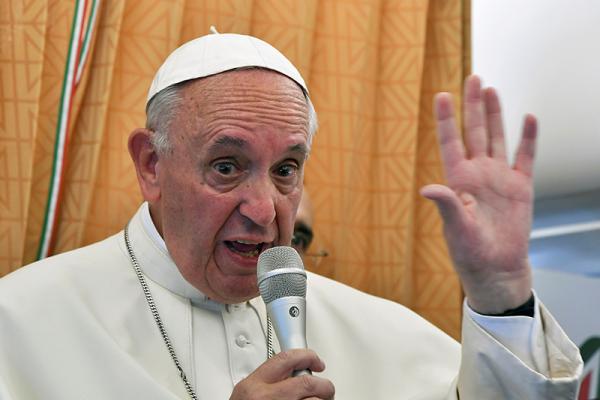Pope Francis has done it again — stepped on an airplane and into the headlines, this time with a remark that the Catholic Church should “apologize” to homosexuals, women, and other exploited groups.
“I think that the Church not only should apologize … to a gay person whom it offended, but it must also apologize to the poor as well, to the women who have been exploited, to children who have been exploited by [being forced to] work. It must apologize for having blessed so many weapons.”
What does it mean — if anything — that this extremely popular pontiff has called his church on the carpet two weeks after the Orlando, Fla., shooting rampage, in which 50 people, including the gunman, were killed?
Let us 'splain:
Q: What does it mean that the pope used the words “I think the Church … should apologize”?
A: Officially, not a lot. Francis can’t issue a formal apology for the church in off-the-cuff remarks made to reporters on the papal plane during a flight back from Armenia. Official Catholic Church apologies are extremely rare — when John Paul II issued a string of them in 2000 a church spokesman called it “an entirely new thing.”
But unofficially, the remark has huge implications. Writing in America magazine, the Rev. James Martin called the remarks “groundbreaking.”
“No matter how many people tell you that this is nothing new, it’s new,” writes Martin, a Jesuit like the pope.
“No pope has spoken like this regarding the LGBT community. Just a few years ago saying that the church should ‘apologize’ to gays and lesbians would have probably gotten a person censured, disciplined or silenced.”
Q: Why would Francis make these remarks if they are not an “official” apology?
A: Several times in the three-plus years he’s been pope, Francis has used informal press conferences to make remarks that have shocked and surprised both Catholics and non-Catholics. His most reverberating remark, perhaps, also had to do with gays when, in 2013, he said, “Who am I to judge them if they are seeking the Lord in good faith?”
The comment ricocheted around the world and jump-started an ongoing conversation about the role of gays in the church — a conversation that remains unresolved. This most recent comment may be another example of Francis using the Catholic version of the bully pulpit to advance issues important to him.
Q: Has the church ever officially apologized to or asked forgiveness of any groups before?
A: Yes. Pope John Paul II — another extremely popular pope — made numerous apologies: for the persecution of Galileo, for the Crusades, for burning people it deemed heretics, for its involvement in slavery, and for its silence and inaction during the Holocaust, among others.
“Recognizing the deviations of the past serves to reawaken our consciences to the compromises of the present,” John Paul II said during the 2000 Jubilee year, a time when the church focuses on pardon, forgiveness, and renewal. But that apology was years in the making, overseen by a committee, and ran 31 pages. It was also extremely careful in its language, concerned that it would be misused by “those hostile to the church.”
And Benedict XVI issued an apology for the clergy sex abuse scandal, saying in 2008, “I am deeply sorry for the pain and suffering the victims have endured and I assure them that, as their pastor, I too share in their suffering.” That speech, too, was carefully planned and orchestrated and was followed by a meeting with some victims and a Mass.
So while Francis’ comments on the plane were not officially sanctioned by the Catholic Church, they are another indication that the new boss ain’t the same as the old boss.
Got something to say about what you're reading? We value your feedback!

